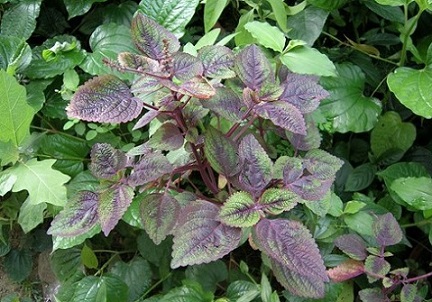Nikhil Prasad Fact checked by:Thailand Medical News Team May 25, 2024 10 months, 4 weeks, 17 hours, 49 minutes ago
Herbs And Phytochemicals - A Natural Solution to Obesity
In recent years, obesity has emerged as a significant global health concern. The increasing prevalence of obesity is linked to a host of serious health issues, including type 2 diabetes, cardiovascular diseases, and certain cancers. Current anti-obesity medications, while effective, often come with a range of undesirable side effects, prompting the search for safer, more natural alternatives. One promising candidate in this quest is the herb Perilla frutescens var. acuta, known for its traditional medicinal uses and potential anti-obesity properties.
 Phytochemicals From The Herb Perilla Frutescens Exhibits Anti-Obesity Potential
The Power of Perilla Frutescens
Phytochemicals From The Herb Perilla Frutescens Exhibits Anti-Obesity Potential
The Power of Perilla Frutescens
Perilla frutescens var. acuta, a member of the Lamiaceae family, is widely used in Asian cuisine and traditional medicine. This herb is renowned for its ability to treat ailments such as colds, coughs, fever, and indigestion. Recent
Herbs And Phytochemicals studies have focused on its bioactive compounds, particularly luteolin-7-O-diglucuronide, apigenin-7-O-diglucuronide, and rosmarinic acid, which exhibit significant anti-adipogenic and thermogenic activities in cellular models.
Key Compounds and Their Effects
Researchers from Ewha Womans University and Seoul Women’s University have isolated three key compounds from Perilla frutescens var. acuta: luteolin-7-O-diglucuronide, apigenin-7-O-diglucuronide, and rosmarinic acid. These compounds were tested for their ability to inhibit the differentiation of preadipocytes into mature fat cells, a process known as adipogenesis, and to promote thermogenesis, the production of heat in the body which can help burn fat.
Anti-Adipogenic Activity
Luteolin-7-O-diglucuronide showed a strong ability to inhibit adipocyte differentiation by suppressing the expression of key genes involved in this process. Specifically, it reduced the expression of the genes Pparg and Cebpa by over 52% and 45%, respectively. Apigenin-7-O-diglucuronide also demonstrated dose-dependent inhibition of these genes, showing reductions of up to 81.6% for Pparg and 37.2% for Cebpa. This indicates that these compounds can effectively prevent the formation of new fat cells.
Thermogenic Activity
In addition to preventing fat cell formation, the compounds from Perilla frutescens var. acuta also promoted thermogenesis. The herb’s water extract and isolated compounds were found to stimulate the expression of genes associated with thermogenesis, such as Ucp1, Pgc1a, and Prdm16. This suggests that these compounds can enhance the body’s ability to burn fat by increasing energy expenditure.
The Broader Impact of Obesity
Obesity is more than just a cosmetic issue; it significantly increases the risk of various diseases. Conditions such as type 2 diabetes, dyslipidemia, hypertension, dementia, and certain cancers are all more prevalent in obese individuals. Tra
ditional anti-obesity medications like orlistat and phentermine, and newer treatments such as GLP-1 agonists, can be effective but often come with side effects like cardiovascular and gastrointestinal symptoms. This underscores the need for safer, natural alternatives.
Mechanisms of Action: How Perilla Frutescens Works
The fight against obesity involves two main strategies: inhibiting the formation of new fat cells (anti-adipogenesis) and increasing the body’s ability to burn fat (thermogenesis). Perilla frutescens var. acuta appears to be effective in both areas. The compounds luteolin-7-O-diglucuronide and apigenin-7-O-diglucuronide inhibit adipogenesis by downregulating the expression of Pparg and Cebpa, which are crucial for fat cell formation. Additionally, these compounds enhance thermogenesis by upregulating the expression of Ucp1, Pgc1a, and Prdm16, genes involved in energy expenditure.
Advanced Research Techniques
To further understand the chemical composition of Perilla frutescens var. acuta, researchers used advanced techniques like ultra-high-performance liquid chromatography coupled with tandem mass spectrometry (UHPLC-MS/MS). This allowed them to create a detailed chemical profile of the herb and identify key bioactive compounds. Through feature-based molecular networking (FBMN) and the Progenesis QI software, they were able to analyze the extract and uncover the presence of flavonoids, phenylpropanoids, and polyphenols.
Potential for Drug Development
The findings from these studies are promising, indicating that compounds from Perilla frutescens var. acuta could be developed into effective anti-obesity drugs. Unlike current medications that often have side effects, these natural compounds offer a safer alternative with their dual action of preventing fat cell formation and promoting fat burning.
Conclusion: A Natural Approach to a Global Issue
The research on Perilla frutescens var. acuta highlights the potential of natural compounds in combating obesity. By inhibiting adipogenesis and promoting thermogenesis, the herb’s bioactive compounds offer a promising, safer alternative to traditional anti-obesity medications. As the global obesity epidemic continues to grow, the discovery and development of such natural treatments become increasingly important. Further studies and clinical trials will be essential to fully understand the mechanisms and efficacy of these compounds, paving the way for new, natural anti-obesity therapies.
The study findings were published in the peer reviewed journal: Molecules.
https://www.mdpi.com/1420-3049/29/11/2465
For the latest on
Herbs And Phytochemicals, keep on logging to Thailand Medical News.
Read Also:
https://www.thailandmedical.news/news/herbs-and-phytochemicals-japanese-study-finds-that-polymethoxyflavones-from-citrus-sphaerocarpa-could-help-in-managing-obesity
https://www.thailandmedical.news/news/health-news-pecans-a-powerful-natural-solution-to-combat-obesity,-diabetes,-and-inflammation
https://www.thailandmedical.news/news/covid-19-news-obesity-linked-to-weakened-immune-response-in-covid-19-patients,-often-leading-to-disease-severity
https://www.thailandmedical.news/news/new-neurons-discovered-could-pave-the-way-for-better-diet-drugs-to-curb-obesity
https://www.thailandmedical.news/news/researchers-discover-new-potential-drug-to-prevent-liver-damage,-obesity-and-glucose-intolerance
https://www.thailandmedical.news/news/bad-gut-microbiome-linked-to-polycystic-ovary-syndrome--and-obesity-in-teenagers
